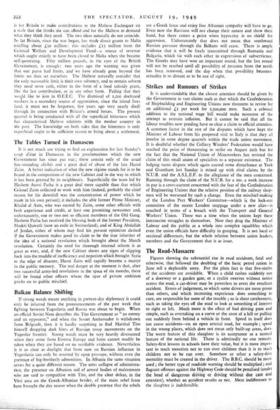Balkan Balance Shifting
If strong words meant anything in present-day diplomacy it could only be inferred from the pronouncements of the past week that fighting between Yugoslavia and Russia was about to begin. When an official Soviet Note describes the Tito Government as " an enemy and an opponent," and when the Soviet Ambassador is withdrawn from Belgrade, then it is hardly surprising to find Marshal Tito himself dropping dark hints of Russian troop movements on the Yugoslav frontier. Strong words must be very heavily discounted when they come from Eastern Europe and hints cannot readily be taken when they are based on no verifiable evidence. Nevertheless it is as clear as daylight that from now on Russian influence in Yugoslavia can only be asserted by open pressure, without even the pretence of big-brotherly admonition. In Albania the same situation arises for a quite different reason. The utter collapse of administra- tion, the presence on Albanian soil of armed bodies of malcontents who are said to sympathise with Tito, and the clear defeat, in the Vitsi area on the Greek-Albanian border, of the main rebel force have brought the day nearer when the double pretence that the rebels are a Greek force and enjoy free Albanian sympathy will have to go. Even now the Russians will not change their nature and show their hand, but there comes a point when hypocrisy is no shield for aggression. Unfortunately that does not mean that southward Russian pressure through the Balkans will cease. There is ample evidence that it will be freely transmitted through Rumania and Bulgaria, which vie with each other in expressions of subservience. The Greeks may have won an important round, but the last round will not be reached until all possibility of invasion from the north has been removed, and the day when that possibility becomes actuality is so distant as to be out of sight.


































 Previous page
Previous page